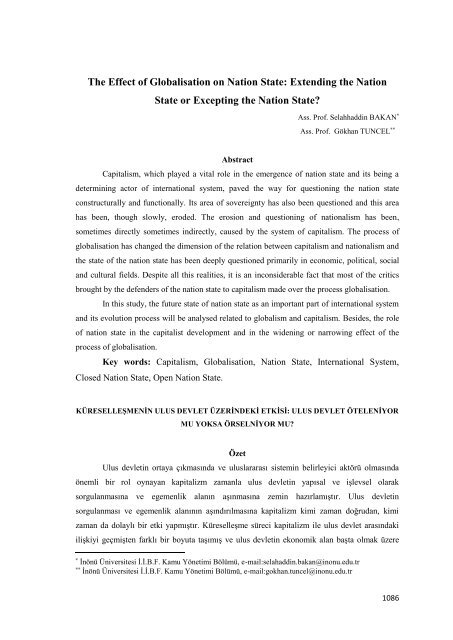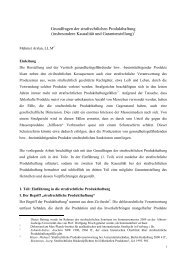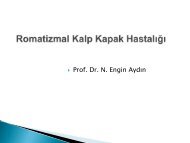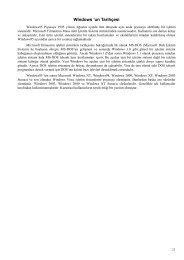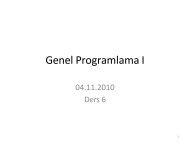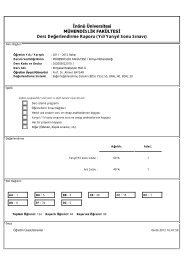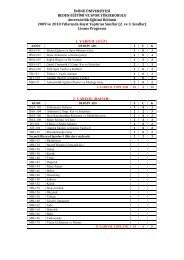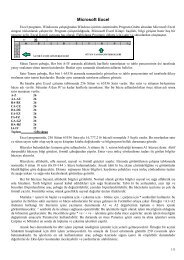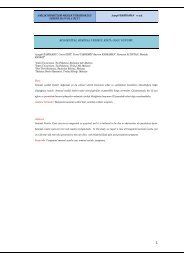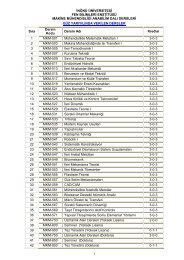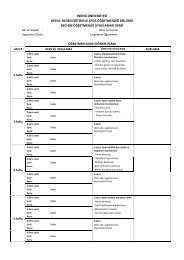The Effect of Globalisation on Nation State: Extending the Nation ...
The Effect of Globalisation on Nation State: Extending the Nation ...
The Effect of Globalisation on Nation State: Extending the Nation ...
You also want an ePaper? Increase the reach of your titles
YUMPU automatically turns print PDFs into web optimized ePapers that Google loves.
<str<strong>on</strong>g>The</str<strong>on</strong>g> <str<strong>on</strong>g>Effect</str<strong>on</strong>g> <str<strong>on</strong>g>of</str<strong>on</strong>g> <str<strong>on</strong>g>Globalisati<strong>on</strong></str<strong>on</strong>g> <strong>on</strong> Nati<strong>on</strong> <strong>State</strong>: <strong>Extending</strong> <strong>the</strong> Nati<strong>on</strong><br />
<strong>State</strong> or Excepting <strong>the</strong> Nati<strong>on</strong> <strong>State</strong>?<br />
Abstract<br />
Ass. Pr<str<strong>on</strong>g>of</str<strong>on</strong>g>. Selahhaddin BAKAN<br />
Ass. Pr<str<strong>on</strong>g>of</str<strong>on</strong>g>. Gökhan TUNCEL<br />
Capitalism, which played a vital role in <strong>the</strong> emergence <str<strong>on</strong>g>of</str<strong>on</strong>g> nati<strong>on</strong> state and its being a<br />
determining actor <str<strong>on</strong>g>of</str<strong>on</strong>g> internati<strong>on</strong>al system, paved <strong>the</strong> way for questi<strong>on</strong>ing <strong>the</strong> nati<strong>on</strong> state<br />
c<strong>on</strong>structurally and functi<strong>on</strong>ally. Its area <str<strong>on</strong>g>of</str<strong>on</strong>g> sovereignty has also been questi<strong>on</strong>ed and this area<br />
has been, though slowly, eroded. <str<strong>on</strong>g>The</str<strong>on</strong>g> erosi<strong>on</strong> and questi<strong>on</strong>ing <str<strong>on</strong>g>of</str<strong>on</strong>g> nati<strong>on</strong>alism has been,<br />
sometimes directly sometimes indirectly, caused by <strong>the</strong> system <str<strong>on</strong>g>of</str<strong>on</strong>g> capitalism. <str<strong>on</strong>g>The</str<strong>on</strong>g> process <str<strong>on</strong>g>of</str<strong>on</strong>g><br />
globalisati<strong>on</strong> has changed <strong>the</strong> dimensi<strong>on</strong> <str<strong>on</strong>g>of</str<strong>on</strong>g> <strong>the</strong> relati<strong>on</strong> between capitalism and nati<strong>on</strong>alism and<br />
<strong>the</strong> state <str<strong>on</strong>g>of</str<strong>on</strong>g> <strong>the</strong> nati<strong>on</strong> state has been deeply questi<strong>on</strong>ed primarily in ec<strong>on</strong>omic, political, social<br />
and cultural fields. Despite all this realities, it is an inc<strong>on</strong>siderable fact that most <str<strong>on</strong>g>of</str<strong>on</strong>g> <strong>the</strong> critics<br />
brought by <strong>the</strong> defenders <str<strong>on</strong>g>of</str<strong>on</strong>g> <strong>the</strong> nati<strong>on</strong> state to capitalism made over <strong>the</strong> process globalisati<strong>on</strong>.<br />
In this study, <strong>the</strong> future state <str<strong>on</strong>g>of</str<strong>on</strong>g> nati<strong>on</strong> state as an important part <str<strong>on</strong>g>of</str<strong>on</strong>g> internati<strong>on</strong>al system<br />
and its evoluti<strong>on</strong> process will be analysed related to globalism and capitalism. Besides, <strong>the</strong> role<br />
<str<strong>on</strong>g>of</str<strong>on</strong>g> nati<strong>on</strong> state in <strong>the</strong> capitalist development and in <strong>the</strong> widening or narrowing effect <str<strong>on</strong>g>of</str<strong>on</strong>g> <strong>the</strong><br />
process <str<strong>on</strong>g>of</str<strong>on</strong>g> globalisati<strong>on</strong>.<br />
Key words: Capitalism, <str<strong>on</strong>g>Globalisati<strong>on</strong></str<strong>on</strong>g>, Nati<strong>on</strong> <strong>State</strong>, Internati<strong>on</strong>al System,<br />
Closed Nati<strong>on</strong> <strong>State</strong>, Open Nati<strong>on</strong> <strong>State</strong>.<br />
KÜRESELLEŞMENİN ULUS DEVLET ÜZERİNDEKİ ETKİSİ: ULUS DEVLET ÖTELENİYOR<br />
MU YOKSA ÖRSELNİYOR MU?<br />
Özet<br />
Ulus devletin ortaya çıkmasında ve uluslararası sistemin belirleyici aktörü olmasında<br />
önemli bir rol oynayan kapitalizm zamanla ulus devletin yapısal ve iĢlevsel olarak<br />
sorgulanmasına ve egemenlik alanın aĢınmasına zemin hazırlamıĢtır. Ulus devletin<br />
sorgulanması ve egemenlik alanının aĢındırılmasına kapitalizm kimi zaman doğrudan, kimi<br />
zaman da dolaylı bir etki yapmıĢtır. KüreselleĢme süreci kapitalizm ile ulus devlet arasındaki<br />
iliĢkiyi geçmiĢten farklı bir boyuta taĢımıĢ ve ulus devletin ek<strong>on</strong>omik alan baĢta olmak üzere<br />
Ġnönü Üniversitesi Ġ.Ġ.B.F. Kamu Yönetimi Bölümü, e-mail:selahaddin.bakan@in<strong>on</strong>u.edu.tr<br />
Ġnönü Üniversitesi Ġ.Ġ.B.F. Kamu Yönetimi Bölümü, e-mail:gokhan.tuncel@in<strong>on</strong>u.edu.tr<br />
1086
siyasal, sosyal ve kültürel alanda yürüttüğü faaliyetlerinin tüm boyutlarıyla sorgulandığı bir<br />
durumu ortaya çıkartmıĢtır. Oysa, kapitalizme yöneltilen eleĢtirilerin bir çoğunun ulus devlet<br />
savunucuları tarafından küreselleĢme süreci üzerinden yapılmakta olması da yadsınamaz bir<br />
gerçektir.<br />
Bu çalıĢmada uluslararası sistemin önemli bir aktörü olan ulus devletin geçmiĢten<br />
günümüze geliĢim süreci ve gelecekteki k<strong>on</strong>umu kapitalizm ve küreselleĢeme bağlamında ele<br />
alınacaktır. Ayrıca ulus devletin kapitalizmin geliĢiminde ve küreselleĢme sürecinin etki<br />
alanının geniĢleme(me)sinde oynadığı rol de bu çalıĢmada irdelenecektir.<br />
Anahtar Kelimeler: Kapitalizm, KüreselleĢme, Ulus Devlet, Uluslararası Sistem,<br />
Kapalı Ulus Devlet, Açık Ulus Devlet<br />
Introducti<strong>on</strong><br />
It is generallyaccepted that ec<strong>on</strong>omic and technological changes that started after<br />
<strong>the</strong> geographical discoveries paved <strong>the</strong> way for industrial revoluti<strong>on</strong> and <strong>the</strong>n <strong>the</strong><br />
process <str<strong>on</strong>g>of</str<strong>on</strong>g> globalisati<strong>on</strong> has begun. Mercantilist and imperialist thought and <strong>the</strong><br />
technological changes that gave chance to mass producti<strong>on</strong> streng<strong>the</strong>ned <strong>the</strong> bourgeoisie<br />
ec<strong>on</strong>omically that never seen in history <str<strong>on</strong>g>of</str<strong>on</strong>g> human kind before. Bourgeoisie had to<br />
produce more and sell this producti<strong>on</strong> to broader markets in order to earn more. To<br />
realise that aim it needed more raw material broader markets and cheaper labour. For<br />
that reas<strong>on</strong>, Bourgeoisie sought an ec<strong>on</strong>omic, political and social envir<strong>on</strong>ment. Raw<br />
material brought from <strong>the</strong> col<strong>on</strong>ies established after <strong>the</strong> geographical discoveries was<br />
<strong>the</strong> cheapest way <str<strong>on</strong>g>of</str<strong>on</strong>g> a sustaining <strong>the</strong> producti<strong>on</strong>. Besides, bringing slaves from those<br />
col<strong>on</strong>ies and c<strong>on</strong>tributed to increase <strong>the</strong> producti<strong>on</strong> and <strong>the</strong> pr<str<strong>on</strong>g>of</str<strong>on</strong>g>it <str<strong>on</strong>g>of</str<strong>on</strong>g> bourgeoisie.<br />
Ano<strong>the</strong>r important amount <str<strong>on</strong>g>of</str<strong>on</strong>g> labour force gained from <strong>the</strong> rural areas. Bourgeoisie<br />
realised that <strong>the</strong> <strong>on</strong>ly way to sustain <strong>the</strong> ec<strong>on</strong>omic power is to secure an aut<strong>on</strong>omous<br />
ec<strong>on</strong>omic area which is free from <strong>the</strong> political authorities <str<strong>on</strong>g>of</str<strong>on</strong>g> nati<strong>on</strong> states. Bourgeoisie<br />
also realised that ec<strong>on</strong>omic arrangements will be insufficient without new political<br />
arrangements. For that reas<strong>on</strong>, Bourgeoisie sought a new political system freed and<br />
liberalised from <strong>the</strong> bosses <str<strong>on</strong>g>of</str<strong>on</strong>g> its assets –kings, boroughs, feuds, lords etc.-(Türe<br />
2008:11). <str<strong>on</strong>g>The</str<strong>on</strong>g> most important expectati<strong>on</strong> <str<strong>on</strong>g>of</str<strong>on</strong>g> bourgeoisie from <strong>the</strong> new political system<br />
was to guarantee <strong>the</strong> security <str<strong>on</strong>g>of</str<strong>on</strong>g> <strong>the</strong> process <str<strong>on</strong>g>of</str<strong>on</strong>g> producti<strong>on</strong> and marketing <str<strong>on</strong>g>of</str<strong>on</strong>g> goods.<br />
1087
Hence, Wallerstein has emphasised <strong>the</strong> importance <str<strong>on</strong>g>of</str<strong>on</strong>g> centre-periphery relati<strong>on</strong>s,<br />
(Wallerstein, 2006:28).<br />
<str<strong>on</strong>g>The</str<strong>on</strong>g> new political system had to have a str<strong>on</strong>g military power in order to sustain<br />
an ec<strong>on</strong>omical producti<strong>on</strong> and marketing in a secure envir<strong>on</strong>ment. It was a necessity<br />
that all <strong>the</strong> producti<strong>on</strong> process –raw material, manufacturing and marketing- needed a<br />
secure envir<strong>on</strong>ment. This political system must be designed in parallel with <strong>the</strong> interest<br />
<str<strong>on</strong>g>of</str<strong>on</strong>g> bourgeoisie. Political systems that based kinship and feudalism and also based <strong>on</strong><br />
religi<strong>on</strong> was something that bourgeoisie never wanted. Because<strong>the</strong> church and <strong>the</strong><br />
feudal structure hampered <strong>the</strong> ec<strong>on</strong>omic development and <strong>the</strong> interest <str<strong>on</strong>g>of</str<strong>on</strong>g> <strong>the</strong> newly<br />
emerged bourgeoisie. Thus, demolishing and reducing <strong>the</strong> effect <str<strong>on</strong>g>of</str<strong>on</strong>g> those traditi<strong>on</strong>al<br />
political regimes suited interest <str<strong>on</strong>g>of</str<strong>on</strong>g> <strong>the</strong> bourgeoisie. <str<strong>on</strong>g>The</str<strong>on</strong>g>re was a vital need for a new<br />
political system to substitute <strong>the</strong> traditi<strong>on</strong>al and religious <strong>on</strong>e. <str<strong>on</strong>g>The</str<strong>on</strong>g> system or model that<br />
bourgeoisie would be effective and determiner <strong>on</strong> its source <str<strong>on</strong>g>of</str<strong>on</strong>g> legality, structure and<br />
functi<strong>on</strong>ing was <strong>the</strong> Nati<strong>on</strong> <strong>State</strong>.<br />
Capitalist ec<strong>on</strong>omic system has been a determining factor in <strong>the</strong> emergence <str<strong>on</strong>g>of</str<strong>on</strong>g><br />
nati<strong>on</strong> state. In <strong>the</strong> United <strong>State</strong>s, England and Scandinavian countries <strong>the</strong> process has<br />
been gradual and smooth. Whereas, in <strong>the</strong> c<strong>on</strong>tinent bourgeoisie gained ec<strong>on</strong>omic and<br />
political power through revoluti<strong>on</strong>s and harsh changes. This difference between <strong>the</strong> two<br />
has caused <strong>the</strong> emergence <str<strong>on</strong>g>of</str<strong>on</strong>g> different kind <str<strong>on</strong>g>of</str<strong>on</strong>g> nati<strong>on</strong> states. Nati<strong>on</strong> states have emerged<br />
in a wide range from c<strong>on</strong>stituti<strong>on</strong>al m<strong>on</strong>archies to republican and federal <strong>on</strong>es. As far as<br />
<strong>the</strong> interest <str<strong>on</strong>g>of</str<strong>on</strong>g> bourgeoisie was c<strong>on</strong>cerned <strong>the</strong> different designati<strong>on</strong> <str<strong>on</strong>g>of</str<strong>on</strong>g> nati<strong>on</strong> sates was<br />
<strong>on</strong>ly symbolic. <str<strong>on</strong>g>The</str<strong>on</strong>g>y carried more or less <strong>the</strong> same features in ec<strong>on</strong>omic matters and in<br />
<strong>the</strong>ir capitalist and imperialist behaviour. <str<strong>on</strong>g>The</str<strong>on</strong>g>refore, even <strong>the</strong> federal structures were not<br />
historically against nati<strong>on</strong> state. C<strong>on</strong>trarily, it was a subcategory <str<strong>on</strong>g>of</str<strong>on</strong>g> nati<strong>on</strong> state<br />
(Akbulut. 2011:34).<br />
1.<str<strong>on</strong>g>The</str<strong>on</strong>g> C<strong>on</strong>cepts <str<strong>on</strong>g>of</str<strong>on</strong>g> Globalizati<strong>on</strong>, <strong>State</strong>, Sovereignty and Nati<strong>on</strong> <strong>State</strong><br />
In social sciences c<strong>on</strong>cepts, instituti<strong>on</strong>s and processes are closely interrelated<br />
with each o<strong>the</strong>r. <str<strong>on</strong>g>Globalisati<strong>on</strong></str<strong>on</strong>g> process has deeply affected <strong>the</strong> sovereignty and <strong>the</strong><br />
functi<strong>on</strong> <str<strong>on</strong>g>of</str<strong>on</strong>g> state and especially nati<strong>on</strong> state. Defining those c<strong>on</strong>cepts will probably serve<br />
to this study to understand <strong>the</strong> effect <str<strong>on</strong>g>of</str<strong>on</strong>g> globalisati<strong>on</strong> <strong>on</strong> nati<strong>on</strong> state.<br />
1088
1.1.<str<strong>on</strong>g>Globalisati<strong>on</strong></str<strong>on</strong>g><br />
<str<strong>on</strong>g>The</str<strong>on</strong>g> c<strong>on</strong>cept <str<strong>on</strong>g>of</str<strong>on</strong>g> globalisati<strong>on</strong> stresses <strong>the</strong> interdependence <str<strong>on</strong>g>of</str<strong>on</strong>g> nati<strong>on</strong>s which goes<br />
back 1500 years before (Modelski.2005:3). It also stresses that <strong>the</strong> development in<br />
communicati<strong>on</strong> and transportati<strong>on</strong> created a smaller world and <strong>the</strong> interacti<strong>on</strong> between<br />
<strong>the</strong> people <str<strong>on</strong>g>of</str<strong>on</strong>g> different nati<strong>on</strong>s has increased. This created a new world c<strong>on</strong>sciousness<br />
(Roberts<strong>on</strong>, 1999:21). <str<strong>on</strong>g>Globalisati<strong>on</strong></str<strong>on</strong>g> is a process that formed <strong>the</strong> capital relati<strong>on</strong>s<br />
(Habermas, 2008:11) and eroded <strong>the</strong> difference emerged from distance. It is<br />
unfortunately not grounded <strong>on</strong> value judgments and ethical codes. However, it created<br />
an envir<strong>on</strong>ment for <strong>the</strong> rapprochement and <strong>the</strong> resemblance <str<strong>on</strong>g>of</str<strong>on</strong>g> values and ethical codes<br />
(EĢkinat, 1998:7-13). <str<strong>on</strong>g>The</str<strong>on</strong>g> main problem is that capitalism has <strong>the</strong> power to erode <strong>the</strong><br />
existing values but it does not replace or repair it. A valueless society is in <strong>the</strong> process<br />
<str<strong>on</strong>g>of</str<strong>on</strong>g> emergence. <str<strong>on</strong>g>The</str<strong>on</strong>g> main questi<strong>on</strong> is that whe<strong>the</strong>r globalisati<strong>on</strong> can composenew and<br />
justifiable values or not. Whereshould <strong>the</strong> nati<strong>on</strong> state stay in this<br />
compositi<strong>on</strong>?<str<strong>on</strong>g>Globalisati<strong>on</strong></str<strong>on</strong>g> does not <strong>on</strong>ly create close relati<strong>on</strong>s between nati<strong>on</strong>s and<br />
compose internati<strong>on</strong>al or regi<strong>on</strong>al ec<strong>on</strong>omic organizati<strong>on</strong>s, but also it does give to<br />
nati<strong>on</strong> states a new role in those newly establishing organisati<strong>on</strong>s. <str<strong>on</strong>g>Globalisati<strong>on</strong></str<strong>on</strong>g> does<br />
also leave nati<strong>on</strong> states with new risks and dangers (Giddens, 2000: 153) which are<br />
bey<strong>on</strong>d <strong>the</strong> traditi<strong>on</strong>al percepti<strong>on</strong> <str<strong>on</strong>g>of</str<strong>on</strong>g> enemy.<br />
1.2.<strong>State</strong><br />
<strong>State</strong> has <strong>the</strong> priority in political science as it is a main political actor and also all<br />
political activities and struggles are being made <strong>on</strong> it (Özipek, 2003:71). Deep in<br />
history, most <str<strong>on</strong>g>of</str<strong>on</strong>g> <strong>the</strong> political writers and thinkers thought that state is something holy<br />
and inevitably necessary organisati<strong>on</strong>. Max Weber defines <strong>the</strong> state “a human<br />
organisati<strong>on</strong> that claims to have <strong>the</strong> right to use legal force in a piece <str<strong>on</strong>g>of</str<strong>on</strong>g> land”<br />
(Heywood, 2011:93<br />
<strong>State</strong> has always been in <strong>the</strong> centre <str<strong>on</strong>g>of</str<strong>on</strong>g> politics as it has deep roots in history and<br />
it has been powerful and surrounding in modern times (Heywood, 2011: 91). Main<br />
features <str<strong>on</strong>g>of</str<strong>on</strong>g> a modern state are:<br />
-to be <strong>the</strong> <strong>on</strong>ly power in c<strong>on</strong>trolling violent means<br />
1089
-to have specific border<br />
-to have a sovereign political body<br />
-to have an independent c<strong>on</strong>stituti<strong>on</strong><br />
-to have n<strong>on</strong>-pers<strong>on</strong>al power<br />
-to have a functi<strong>on</strong>ing public bureaucracy<br />
-to have a widely accepted authority and legality<br />
-to have abiding citizens and<br />
-to have <strong>the</strong> power to put tax <strong>on</strong> <strong>the</strong>m (See, Piers<strong>on</strong>, 2004: 6).<br />
It is understood from those features that state puts itself in <strong>the</strong> decree that it<br />
thought it surpassed (Kahraman, 2002: 5). <str<strong>on</strong>g>Globalisati<strong>on</strong></str<strong>on</strong>g> process has been subject to<br />
questi<strong>on</strong> about <strong>the</strong> future <str<strong>on</strong>g>of</str<strong>on</strong>g> state and especially nati<strong>on</strong> state which is an important actor<br />
<str<strong>on</strong>g>of</str<strong>on</strong>g> internati<strong>on</strong>al system.<br />
1.3.Sovereignty<br />
French writer Jean Bodin first used <strong>the</strong> term and emphasised its importance in a<br />
state organisati<strong>on</strong>. He produced <strong>the</strong> term from <strong>the</strong> Latin term “superanus” which means<br />
supreme or utmost. French lawyer used <strong>the</strong> term “souveranité” (Bodin, 2003:1) to<br />
emphasise <strong>the</strong> absolute and <strong>the</strong> everlasting power <str<strong>on</strong>g>of</str<strong>on</strong>g> <strong>the</strong> state. According to Bodin<br />
sovereignty cannot be bounded and it is absolute. It is <strong>the</strong> main comp<strong>on</strong>ent that<br />
differentiates modern nati<strong>on</strong> states from medieval political organisati<strong>on</strong>s(BeriĢ,<br />
2003:493).<br />
<str<strong>on</strong>g>The</str<strong>on</strong>g> term “sovereignty” practically came out after <strong>the</strong> Act <str<strong>on</strong>g>of</str<strong>on</strong>g> Westphalia signed<br />
in 1648. Undoubtedly, modern state, which feels <strong>the</strong> right to have force by establishing<br />
nati<strong>on</strong>al armies and to have <strong>the</strong> right to put taxes <strong>on</strong> his citizens, gave preference to <strong>the</strong><br />
term sovereignty to come out. After <strong>the</strong> thirty years wars, princedoms in Europe<br />
accepted to use <strong>the</strong>ir own land freely and to respect geographical boundaries <strong>the</strong> o<strong>the</strong>rs.<br />
Respecting sovereign power <str<strong>on</strong>g>of</str<strong>on</strong>g> <strong>the</strong> o<strong>the</strong>rs laid <strong>the</strong> foundati<strong>on</strong> <str<strong>on</strong>g>of</str<strong>on</strong>g> modern nati<strong>on</strong> states<br />
(see, Philpott, 2001: 4). As far as modern states are c<strong>on</strong>cerned, <strong>the</strong> most important<br />
results <str<strong>on</strong>g>of</str<strong>on</strong>g> Westphalia Act are that it created a relati<strong>on</strong> between <strong>the</strong> land and authority.<br />
Thus states’authority was accepted in all parts <str<strong>on</strong>g>of</str<strong>on</strong>g> <strong>the</strong> geography that state had <strong>the</strong><br />
sovereignty <strong>on</strong> (for more see, Philpott, 1999: -144-167).<br />
1090
Before <strong>the</strong> First World War Wils<strong>on</strong> principles added a new dimensi<strong>on</strong> to <strong>the</strong><br />
term by aiming to design a world in which all independent states had <strong>the</strong> right for self-<br />
determinati<strong>on</strong>, security (Smith, 1995:62) interrelated to each o<strong>the</strong>r by <strong>the</strong> power <str<strong>on</strong>g>of</str<strong>on</strong>g> law<br />
and ec<strong>on</strong>omy and democracy (Heckscher, 1994:104).<br />
1.4.Nati<strong>on</strong> <strong>State</strong><br />
Nati<strong>on</strong> state emerged as c<strong>on</strong>tinuati<strong>on</strong> modern state (Heywood, 2011:92) and it<br />
dominated centrally both religious and n<strong>on</strong>-religious instituti<strong>on</strong>s and groups in 15 and<br />
16 centuries in Europe. It became widespread state model in <strong>the</strong> world. While in<br />
capitalist free market ec<strong>on</strong>omies <str<strong>on</strong>g>of</str<strong>on</strong>g> Europe created <strong>the</strong> nati<strong>on</strong> state functi<strong>on</strong>ally, in most<br />
<str<strong>on</strong>g>of</str<strong>on</strong>g> <strong>the</strong> o<strong>the</strong>r parts <str<strong>on</strong>g>of</str<strong>on</strong>g> <strong>the</strong> world because <str<strong>on</strong>g>of</str<strong>on</strong>g> <strong>the</strong> lack <str<strong>on</strong>g>of</str<strong>on</strong>g> free market ec<strong>on</strong>omy and capital<br />
accumulati<strong>on</strong>state nati<strong>on</strong>s emerged instead <str<strong>on</strong>g>of</str<strong>on</strong>g> nati<strong>on</strong> states. It can be said that<br />
emergence <str<strong>on</strong>g>of</str<strong>on</strong>g> nati<strong>on</strong> states are mainly related to mercantilism which brought out after<br />
<strong>the</strong> col<strong>on</strong>ialism.<br />
However <strong>the</strong> emerging ec<strong>on</strong>omic system (Wallerstein, 1974: 391) named as <strong>the</strong><br />
capitalism bey<strong>on</strong>d <strong>the</strong> nati<strong>on</strong> or internati<strong>on</strong>al capitalism (See, Robins<strong>on</strong>, 2004, p.18, and<br />
p.23-24), <strong>the</strong> phenomena <str<strong>on</strong>g>of</str<strong>on</strong>g> nati<strong>on</strong> state has historically been perceived as <strong>the</strong> political<br />
form <str<strong>on</strong>g>of</str<strong>on</strong>g> capitalism Wallerstein, 2010:143).Nati<strong>on</strong> states like Portugal, Ne<strong>the</strong>rland and<br />
England played important rolesin <strong>the</strong> formati<strong>on</strong> global system as effective actors (see,<br />
Modelski, 2005:21).<br />
Nati<strong>on</strong> state which can be said that it is a political formati<strong>on</strong> <str<strong>on</strong>g>of</str<strong>on</strong>g> capitalism is<br />
divided into two subgroups as united <strong>on</strong>e and federal <strong>on</strong>e. Federal state is not<br />
historically against <strong>the</strong> nati<strong>on</strong> state, c<strong>on</strong>trarily, it is a sub-categories <str<strong>on</strong>g>of</str<strong>on</strong>g> nati<strong>on</strong><br />
state(Akbulut, 2011 34).<br />
<str<strong>on</strong>g>The</str<strong>on</strong>g> term “Nati<strong>on</strong>” can be analysed and scrutinised from <strong>the</strong> ethnicity debates<br />
that derived from German romantics to French Nati<strong>on</strong>alism <str<strong>on</strong>g>of</str<strong>on</strong>g> territorial nati<strong>on</strong>alism<br />
that derived from geographic c<strong>on</strong>siderati<strong>on</strong> <str<strong>on</strong>g>of</str<strong>on</strong>g> borders. In <strong>the</strong> definiti<strong>on</strong>s <str<strong>on</strong>g>of</str<strong>on</strong>g> nati<strong>on</strong> state<br />
<strong>on</strong>e can see objective (!) elements (to live in <strong>the</strong> same geography and to speak <strong>the</strong> same<br />
language) and emoti<strong>on</strong>al elements (<strong>the</strong> comm<strong>on</strong> destiny and comm<strong>on</strong> race) (See, Eken,<br />
2006: 249).<br />
However different methods <strong>the</strong>y might have Federal and united nati<strong>on</strong> states<br />
intensely tried to build a homogeneous populati<strong>on</strong> (see, Wallerstein, 2010: 146-170).<br />
1091
French revoluti<strong>on</strong> <str<strong>on</strong>g>of</str<strong>on</strong>g> 1789 was starting point in <strong>the</strong> formati<strong>on</strong> <str<strong>on</strong>g>of</str<strong>on</strong>g> a homogeneous<br />
populati<strong>on</strong> (Sarıca, 1969: 104).<br />
<str<strong>on</strong>g>The</str<strong>on</strong>g> ease in <strong>the</strong> transportati<strong>on</strong> and communicati<strong>on</strong> costs paved <strong>the</strong> way for <strong>the</strong><br />
emergence <str<strong>on</strong>g>of</str<strong>on</strong>g> a new and powerful bourgeoisie(see, Gereffi: 1994) in internati<strong>on</strong>al level<br />
and this played a crucial role in <strong>the</strong> formati<strong>on</strong> <str<strong>on</strong>g>of</str<strong>on</strong>g> nati<strong>on</strong> states. Industrial revoluti<strong>on</strong> and<br />
<strong>the</strong> emergence <str<strong>on</strong>g>of</str<strong>on</strong>g> bourgeoisie in <strong>the</strong> West created <strong>the</strong> nati<strong>on</strong> state. In c<strong>on</strong>trast, in some<br />
o<strong>the</strong>r parts <str<strong>on</strong>g>of</str<strong>on</strong>g> <strong>the</strong> world (especially and generally in <strong>the</strong> East) where <strong>the</strong> industrial<br />
revoluti<strong>on</strong> did not take place or delayed bourgeoisie did not emerge and <strong>the</strong> state had to<br />
take initiative ec<strong>on</strong>omy and investments. In those places <strong>State</strong> Nati<strong>on</strong>s or imaginary<br />
nati<strong>on</strong>s (see, Anders<strong>on</strong>, 2011) emerged.<br />
2.<str<strong>on</strong>g>The</str<strong>on</strong>g> <str<strong>on</strong>g>Effect</str<strong>on</strong>g> <str<strong>on</strong>g>of</str<strong>on</strong>g> <str<strong>on</strong>g>Globalisati<strong>on</strong></str<strong>on</strong>g> <strong>on</strong> Nati<strong>on</strong> <strong>State</strong><br />
It is generally accepted that globalisati<strong>on</strong> describes <strong>the</strong> fast change and<br />
transformati<strong>on</strong> (Capra, 2003: 113) in <strong>the</strong> world size and wide. Although it has a l<strong>on</strong>g<br />
history, it emerged after <strong>the</strong> industrial revoluti<strong>on</strong> and globalisati<strong>on</strong> process fastened<br />
after 1980’s when new forms, rhythms and relati<strong>on</strong>s(Hall, 1991: 19) developed in<br />
internati<strong>on</strong>al system. Main characteristics <str<strong>on</strong>g>of</str<strong>on</strong>g> globalisati<strong>on</strong> is that individuals, images,<br />
technologies, technics and similar objects are in a permanent move and <strong>the</strong>y are always<br />
mobile without being bounded by any boundaries (see, Appadurai,1999: 229-238).<br />
Time saving developments in transportati<strong>on</strong> and communicati<strong>on</strong> means <strong>on</strong> <strong>the</strong><br />
<strong>on</strong>e hand resulted in <strong>the</strong> signing <str<strong>on</strong>g>of</str<strong>on</strong>g> <strong>the</strong> act <str<strong>on</strong>g>of</str<strong>on</strong>g> Westphalia which was a turning point in<br />
securing sovereign rights <str<strong>on</strong>g>of</str<strong>on</strong>g> states. On <strong>the</strong> o<strong>the</strong>r hand, those developments paved <strong>the</strong><br />
way for a new internati<strong>on</strong>al system that somewhat started to erode <strong>the</strong> sovereignty rights<br />
and area <str<strong>on</strong>g>of</str<strong>on</strong>g> <strong>the</strong> states. Hence, nati<strong>on</strong> state is to go bey<strong>on</strong>d its boundaries. European<br />
Uni<strong>on</strong> is <strong>on</strong>e <str<strong>on</strong>g>of</str<strong>on</strong>g> <strong>the</strong> most important regi<strong>on</strong>al ec<strong>on</strong>omic organisati<strong>on</strong>s because it slowly<br />
eroded <strong>the</strong> boundaries between European Nati<strong>on</strong>s without demolishing or humiliating<br />
<strong>the</strong> nati<strong>on</strong> state. Nati<strong>on</strong> states are still important and indispensable actors <str<strong>on</strong>g>of</str<strong>on</strong>g> today’s<br />
world as l<strong>on</strong>g as <strong>the</strong>y stay open to <strong>the</strong> world and integrated to regi<strong>on</strong>al (c<strong>on</strong>tinental) or<br />
internati<strong>on</strong>al ec<strong>on</strong>omic system. This will secure <strong>the</strong> nati<strong>on</strong> states and at <strong>the</strong> same time<br />
eliminate any danger to <strong>the</strong> nati<strong>on</strong> state and to <strong>the</strong> internati<strong>on</strong>al system. Thus, <strong>the</strong> term<br />
“nati<strong>on</strong> state” itself nei<strong>the</strong>r is to be proud <str<strong>on</strong>g>of</str<strong>on</strong>g> nor is it something to be ashamed <str<strong>on</strong>g>of</str<strong>on</strong>g>.<br />
Problem is how to design or how and under which c<strong>on</strong>diti<strong>on</strong>s open and n<strong>on</strong>-dangerous<br />
1092
nati<strong>on</strong> state will emerge instead <str<strong>on</strong>g>of</str<strong>on</strong>g> closed and authoritarian <strong>on</strong>es.<str<strong>on</strong>g>The</str<strong>on</strong>g> next secti<strong>on</strong> will<br />
try to analyse <strong>the</strong> effect <str<strong>on</strong>g>of</str<strong>on</strong>g> globalisati<strong>on</strong> <strong>on</strong> nati<strong>on</strong> state and seek an answer to <strong>the</strong><br />
questi<strong>on</strong> menti<strong>on</strong>ed above.<br />
2.1.<str<strong>on</strong>g>The</str<strong>on</strong>g> Ec<strong>on</strong>omic <str<strong>on</strong>g>Effect</str<strong>on</strong>g> <str<strong>on</strong>g>of</str<strong>on</strong>g> <str<strong>on</strong>g>Globalisati<strong>on</strong></str<strong>on</strong>g> <strong>on</strong> Nati<strong>on</strong> <strong>State</strong><br />
<str<strong>on</strong>g>The</str<strong>on</strong>g> intense ec<strong>on</strong>omic and political competiti<strong>on</strong> between nati<strong>on</strong> states which was<br />
started in <strong>the</strong> sec<strong>on</strong>d half <str<strong>on</strong>g>of</str<strong>on</strong>g> <strong>the</strong> 19 th centurycaused two big wars that human being never<br />
saw before: <str<strong>on</strong>g>The</str<strong>on</strong>g> First World War and <str<strong>on</strong>g>The</str<strong>on</strong>g> sec<strong>on</strong>d. Perhaps <strong>the</strong> main but unseen cause <str<strong>on</strong>g>of</str<strong>on</strong>g><br />
<strong>the</strong> wars was that closed nati<strong>on</strong> states built by functi<strong>on</strong>ing <str<strong>on</strong>g>of</str<strong>on</strong>g> capitalist process did not<br />
meet <strong>the</strong> requirements <str<strong>on</strong>g>of</str<strong>on</strong>g> capitalist ec<strong>on</strong>omies any more. Comparing to city states,<br />
nati<strong>on</strong> states were pr<str<strong>on</strong>g>of</str<strong>on</strong>g>itable in size in order for capitalism to repeat itself. But extra<br />
ordinary development in industrialisati<strong>on</strong> process necessitated capitalist system to have<br />
bigger areas for marketing and raw material. Nati<strong>on</strong> state was an optimal size for <strong>the</strong><br />
new ec<strong>on</strong>omic system. <str<strong>on</strong>g>The</str<strong>on</strong>g> new system required c<strong>on</strong>tinent wide loose (but not weak)<br />
organisati<strong>on</strong>s and even worldwide arrangements and agreement with <strong>the</strong> prior col<strong>on</strong>ies<br />
and so called with third world. After <strong>the</strong> Sec<strong>on</strong>d World War, <strong>the</strong> world mainly divided<br />
into two: <str<strong>on</strong>g>The</str<strong>on</strong>g> West leader <str<strong>on</strong>g>of</str<strong>on</strong>g> which was <strong>the</strong> United <strong>State</strong>s <str<strong>on</strong>g>of</str<strong>on</strong>g> America and <str<strong>on</strong>g>The</str<strong>on</strong>g> East <strong>the</strong><br />
leader which was <str<strong>on</strong>g>The</str<strong>on</strong>g> Soviet Uni<strong>on</strong>. This polarisati<strong>on</strong> started an ec<strong>on</strong>omic competiti<strong>on</strong><br />
between <strong>the</strong> two. <str<strong>on</strong>g>The</str<strong>on</strong>g> capitalist system <str<strong>on</strong>g>of</str<strong>on</strong>g> <strong>the</strong> West underwent through some crisis <strong>the</strong><br />
biggest <str<strong>on</strong>g>of</str<strong>on</strong>g> which was in1929. Income distributi<strong>on</strong> was <strong>on</strong>e <str<strong>on</strong>g>of</str<strong>on</strong>g> <strong>the</strong> biggest illnesses <str<strong>on</strong>g>of</str<strong>on</strong>g><br />
capitalism. It was not a crisis <str<strong>on</strong>g>of</str<strong>on</strong>g> shortage <str<strong>on</strong>g>of</str<strong>on</strong>g> food or goods. Food and goods were<br />
aband<strong>on</strong>ed but people did not have enough income to buy <strong>the</strong>m because <str<strong>on</strong>g>of</str<strong>on</strong>g> low wages<br />
for labour which resulted from harsh competiti<strong>on</strong> between employers. <str<strong>on</strong>g>The</str<strong>on</strong>g> supply <str<strong>on</strong>g>of</str<strong>on</strong>g><br />
labour was increasing more and more because <str<strong>on</strong>g>of</str<strong>on</strong>g> improvements in health service and<br />
<strong>the</strong>re were not enough social security and social policies. After <strong>the</strong> Sec<strong>on</strong>d World War,<br />
it was realised that unless some measures are taken by <strong>the</strong> states and bey<strong>on</strong>d <strong>the</strong> state,<br />
socialism in <strong>the</strong> East will c<strong>on</strong>tinue to gain more funs and capitalist system will stop to<br />
repeat (recirculate) itself (Bakan, 2009: 2097-2107). Keynesian policies were accepted<br />
by most <str<strong>on</strong>g>of</str<strong>on</strong>g> <strong>the</strong> Western countries in order to get rid <str<strong>on</strong>g>of</str<strong>on</strong>g> those illnesses (Kazgan, 1995:<br />
42). Ano<strong>the</strong>r development in <strong>the</strong> newly independent third world countries was that those<br />
countries equalised <strong>the</strong> imperialism with capitalism and rejected a western style political<br />
and ec<strong>on</strong>omic system. <str<strong>on</strong>g>The</str<strong>on</strong>g> lack <str<strong>on</strong>g>of</str<strong>on</strong>g> capital accumulati<strong>on</strong> added to that and those<br />
1093
countries mostly produced state initiated nati<strong>on</strong>al socialist systems. In those countries<br />
state nati<strong>on</strong>s emerged instead <str<strong>on</strong>g>of</str<strong>on</strong>g> nati<strong>on</strong> states. This did not in any way help for <strong>the</strong><br />
globalisati<strong>on</strong> <str<strong>on</strong>g>of</str<strong>on</strong>g> <strong>the</strong> world until 1990’s when <strong>the</strong> Soviet Uni<strong>on</strong> and <str<strong>on</strong>g>of</str<strong>on</strong>g> course communist<br />
system collapsed. <str<strong>on</strong>g>The</str<strong>on</strong>g> collapse <str<strong>on</strong>g>of</str<strong>on</strong>g> <strong>the</strong> Soviet showed us that <strong>the</strong> state initiated<br />
ec<strong>on</strong>omies could not renew(Bakan, 2009: 2097-2107) <strong>the</strong>mselves. <str<strong>on</strong>g>The</str<strong>on</strong>g> competiti<strong>on</strong><br />
between <strong>the</strong> two poles during <strong>the</strong> Cold War was generally seen as political but <strong>the</strong><br />
ec<strong>on</strong>omy and ec<strong>on</strong>omic model was determining factor. As a matter <str<strong>on</strong>g>of</str<strong>on</strong>g> fact, <strong>the</strong> reas<strong>on</strong><br />
for <strong>the</strong> collapse <str<strong>on</strong>g>of</str<strong>on</strong>g> <strong>the</strong> Soviet Uni<strong>on</strong> was its ec<strong>on</strong>omic weakness. For <strong>the</strong> first time<br />
perhaps in <strong>the</strong> history a super power collapsed without any foreign interventi<strong>on</strong> due to<br />
ec<strong>on</strong>omic inefficiencies. After <strong>the</strong> Cold War, worldwide ec<strong>on</strong>omic inequalities and<br />
problems between <strong>the</strong> North and East became <strong>on</strong>e <str<strong>on</strong>g>of</str<strong>on</strong>g> <strong>the</strong> main problems in hand. United<br />
<strong>State</strong>stried to design a new world by <strong>the</strong> project <str<strong>on</strong>g>of</str<strong>on</strong>g> New World Order. However, <strong>the</strong><br />
new world order was not something to be put by <strong>the</strong> order <str<strong>on</strong>g>of</str<strong>on</strong>g> United <strong>State</strong>s. United<br />
<strong>State</strong>s did not give up its habit <str<strong>on</strong>g>of</str<strong>on</strong>g> military interventi<strong>on</strong> in order to give an order to <strong>the</strong><br />
world. It is understood that <strong>the</strong> realist foreign policy <str<strong>on</strong>g>of</str<strong>on</strong>g> <strong>the</strong> United <strong>State</strong>s is not a reality<br />
<str<strong>on</strong>g>of</str<strong>on</strong>g> today’s world. Nei<strong>the</strong>r does it help <strong>the</strong> globalisati<strong>on</strong>. For a justified globalisati<strong>on</strong>, a<br />
worldwide ec<strong>on</strong>omic policy that includes social security, employer-employee relati<strong>on</strong>s,<br />
income distributi<strong>on</strong> and so <strong>on</strong> should be discussed. <str<strong>on</strong>g>The</str<strong>on</strong>g>n a worldwide functi<strong>on</strong>ing<br />
ec<strong>on</strong>omic system might gradually arise. Nati<strong>on</strong>al socialist or authoritarian states will<br />
perhaps turn into open nati<strong>on</strong> states. What is happening in <strong>the</strong> Arabic world is really<br />
spectacular. Arab spring is about to be Arab winter unless something d<strong>on</strong>e ec<strong>on</strong>omically<br />
to ease transformati<strong>on</strong> process. Perhaps in <strong>the</strong> o<strong>the</strong>r parts <str<strong>on</strong>g>of</str<strong>on</strong>g> <strong>the</strong> world, Arabic like<br />
uprisings will emerge. <str<strong>on</strong>g>The</str<strong>on</strong>g> easy but a l<strong>on</strong>g time prescripti<strong>on</strong> for those states is to try to<br />
integrate <strong>the</strong>m to <strong>the</strong> ec<strong>on</strong>omies <str<strong>on</strong>g>of</str<strong>on</strong>g> <strong>the</strong> West. This requires states’ good will and <strong>the</strong><br />
prosperous countries <str<strong>on</strong>g>of</str<strong>on</strong>g> <strong>the</strong> North should give up <strong>the</strong>ir habit <str<strong>on</strong>g>of</str<strong>on</strong>g> col<strong>on</strong>isati<strong>on</strong>. O<strong>the</strong>rwise,<br />
capitalist system <str<strong>on</strong>g>of</str<strong>on</strong>g> <strong>the</strong> North will c<strong>on</strong>tinue to face new crisis and this in turn will harm<br />
<strong>the</strong> nati<strong>on</strong> states <str<strong>on</strong>g>of</str<strong>on</strong>g> <strong>the</strong> North. <str<strong>on</strong>g>The</str<strong>on</strong>g> zero-sum game <str<strong>on</strong>g>of</str<strong>on</strong>g> <strong>the</strong> West(ec<strong>on</strong>omically <strong>the</strong> North)<br />
in <strong>the</strong> l<strong>on</strong>g run will put <strong>the</strong>ir ec<strong>on</strong>omies into crisis because <str<strong>on</strong>g>of</str<strong>on</strong>g> <strong>the</strong> shortage <str<strong>on</strong>g>of</str<strong>on</strong>g> market in<br />
<strong>the</strong> East and that in turn will make <strong>the</strong> Western countries close <strong>the</strong>ir border in order to<br />
prevent <strong>the</strong>ir political and ec<strong>on</strong>omic system. This will not in any way help <strong>the</strong><br />
globalisati<strong>on</strong> <str<strong>on</strong>g>of</str<strong>on</strong>g> <strong>the</strong> world.<br />
1094
2.2. <str<strong>on</strong>g>The</str<strong>on</strong>g> Political <str<strong>on</strong>g>Effect</str<strong>on</strong>g> <str<strong>on</strong>g>of</str<strong>on</strong>g> <str<strong>on</strong>g>Globalisati<strong>on</strong></str<strong>on</strong>g> <strong>on</strong> Nati<strong>on</strong> <strong>State</strong><br />
<str<strong>on</strong>g>The</str<strong>on</strong>g> state was <strong>on</strong>e <str<strong>on</strong>g>of</str<strong>on</strong>g> <strong>the</strong> (perhaps <strong>the</strong> <strong>on</strong>ly) actor keeping in hand <strong>the</strong> right <str<strong>on</strong>g>of</str<strong>on</strong>g><br />
sovereignty in modern times. In that time, even <strong>the</strong> use <str<strong>on</strong>g>of</str<strong>on</strong>g> individual right and<br />
freedomsin social relati<strong>on</strong>s was granted and permitted by <strong>the</strong> state (Ağaoğulları,<br />
1989:204). Fast technologic and ec<strong>on</strong>omic developments caused to some changes in<br />
internati<strong>on</strong>al system and especially <strong>the</strong> state <str<strong>on</strong>g>of</str<strong>on</strong>g> <strong>the</strong> nati<strong>on</strong> state.<br />
Those changes in technology and ec<strong>on</strong>omy have also affected <strong>the</strong> social,<br />
political and cultural areas. On <strong>on</strong>e hand, those changes veiled local, regi<strong>on</strong>al and<br />
nati<strong>on</strong>al differences with <strong>the</strong>ir generalising specialities (King, 1998: 30); <strong>on</strong> <strong>the</strong> o<strong>the</strong>r<br />
hand, <strong>the</strong>y allowed local specialities to be recognised in global size.<br />
<str<strong>on</strong>g>Globalisati<strong>on</strong></str<strong>on</strong>g> process has a major affect <strong>on</strong> <strong>the</strong> statute and functi<strong>on</strong>ing <str<strong>on</strong>g>of</str<strong>on</strong>g> nati<strong>on</strong><br />
state. This process has affected <strong>the</strong> thought <str<strong>on</strong>g>of</str<strong>on</strong>g> nati<strong>on</strong> and somewhat eroded <strong>the</strong> thought<br />
<str<strong>on</strong>g>of</str<strong>on</strong>g> state (K<strong>on</strong>ak, 2011: 154) which <strong>on</strong>ce was indispensable and unavoidable. This<br />
process has also a weakening effect <strong>on</strong> <strong>the</strong> decisi<strong>on</strong> making capabilities <str<strong>on</strong>g>of</str<strong>on</strong>g> governments<br />
(Bauman, 2006: 11).Intoday’s world it is impossible to maintain nati<strong>on</strong> state depending<br />
its authoritarian source <str<strong>on</strong>g>of</str<strong>on</strong>g> modern and classic times. Decisi<strong>on</strong>s that <strong>on</strong>ce were taken<br />
according to sovereignty and authority <str<strong>on</strong>g>of</str<strong>on</strong>g> nati<strong>on</strong> states are not acceptable any more in a<br />
globalised world (Korbin, 1977: 157-159). Internati<strong>on</strong>alsociety does not accept such an<br />
independent! Applicati<strong>on</strong> as it does not suit to human rights and to <strong>the</strong> emerging global<br />
understanding. Citizens <str<strong>on</strong>g>of</str<strong>on</strong>g> those states are also rejecting such applicati<strong>on</strong>s because <strong>the</strong>y<br />
know with <strong>the</strong> help <str<strong>on</strong>g>of</str<strong>on</strong>g> communicati<strong>on</strong> technologies what is happening outside <strong>the</strong>ir<br />
countries. What is happening in <strong>the</strong> Arab world, especially in Syriais quite dramatic and<br />
a good example <str<strong>on</strong>g>of</str<strong>on</strong>g> this.<br />
Liberalism which is a pushing power <str<strong>on</strong>g>of</str<strong>on</strong>g> globalisati<strong>on</strong> emphasises <strong>on</strong> <strong>on</strong>e hand<br />
<strong>the</strong> importance <str<strong>on</strong>g>of</str<strong>on</strong>g> free market ec<strong>on</strong>omies, <strong>on</strong> <strong>the</strong> o<strong>the</strong>r hand, it does emphasise <strong>the</strong><br />
protecti<strong>on</strong> <str<strong>on</strong>g>of</str<strong>on</strong>g> individual rights and freedom <str<strong>on</strong>g>of</str<strong>on</strong>g> citizens by <strong>the</strong> state (see,Heywood,<br />
2011:86). C<strong>on</strong>trary to emerging times <str<strong>on</strong>g>of</str<strong>on</strong>g> nati<strong>on</strong> state, Liberal ideology in a globalising<br />
world has caused a decrease in <strong>the</strong> power <str<strong>on</strong>g>of</str<strong>on</strong>g> nati<strong>on</strong> state (McMichel, 1996: 197-207)<br />
and it has also made us questi<strong>on</strong> (Evans, 1997: 82-87). In this c<strong>on</strong>text, Nati<strong>on</strong> states are<br />
facing new social and political disturbances in nati<strong>on</strong>al and global size (Rodrik, 1997:1-<br />
6). As nati<strong>on</strong> state sought to secure stability, it tried to use all means in order to create a<br />
1095
homogeneous society by removing (sometimes in some countries by using harsh<br />
methods) <strong>the</strong> differences. Whereas, <strong>the</strong> process <str<strong>on</strong>g>of</str<strong>on</strong>g> globalisati<strong>on</strong> <strong>on</strong> <strong>on</strong>e hand is creating<br />
closer and more similar societies and people, <strong>on</strong> <strong>the</strong> o<strong>the</strong>r hand, it does help to bring<br />
back and reanimate different local and regi<strong>on</strong>al differences which nati<strong>on</strong> state tried to<br />
remove and homogenise (Bilig, 2002:151).<br />
<str<strong>on</strong>g>Globalisati<strong>on</strong></str<strong>on</strong>g> process led to a lot <str<strong>on</strong>g>of</str<strong>on</strong>g> new ec<strong>on</strong>omic, political, social and<br />
envir<strong>on</strong>mental problems that are bey<strong>on</strong>d <strong>the</strong> nati<strong>on</strong>al size. It does<br />
necessitatedinternati<strong>on</strong>al organisati<strong>on</strong>s in all aspects <str<strong>on</strong>g>of</str<strong>on</strong>g> <strong>the</strong> life. <str<strong>on</strong>g>The</str<strong>on</strong>g>n nati<strong>on</strong> state will<br />
go bey<strong>on</strong>d its border without being harmed. Especially <strong>the</strong> process <str<strong>on</strong>g>of</str<strong>on</strong>g> integrati<strong>on</strong><br />
through fragmentati<strong>on</strong> in Europe has created powerful, sustainable and stable<br />
internati<strong>on</strong>al bodies that pushed nati<strong>on</strong> states bey<strong>on</strong>d its border. Member states <str<strong>on</strong>g>of</str<strong>on</strong>g> <strong>the</strong><br />
European Uni<strong>on</strong> had to give up and transfer <strong>the</strong>ir authority to <strong>the</strong> bodies <str<strong>on</strong>g>of</str<strong>on</strong>g> <strong>the</strong> Uni<strong>on</strong>.<br />
Besides, <strong>the</strong> same member states gave up <strong>the</strong>ir authority to local authorities as<br />
subsidiarity rule acted in Maastricht.<br />
<str<strong>on</strong>g>Globalisati<strong>on</strong></str<strong>on</strong>g> process has also created a base for n<strong>on</strong>-governmental<br />
organisati<strong>on</strong>s to functi<strong>on</strong> in a wider area without struggling against <strong>the</strong> rules and<br />
limitati<strong>on</strong>s <str<strong>on</strong>g>of</str<strong>on</strong>g> nati<strong>on</strong> state while functi<strong>on</strong>ing. Internati<strong>on</strong>al system –especially regi<strong>on</strong>al<br />
ec<strong>on</strong>omic integrati<strong>on</strong>s- has granted n<strong>on</strong>-governmental organisati<strong>on</strong>s a lot <str<strong>on</strong>g>of</str<strong>on</strong>g> advantages<br />
in this struggle. <str<strong>on</strong>g>The</str<strong>on</strong>g> increasing effect <str<strong>on</strong>g>of</str<strong>on</strong>g> n<strong>on</strong>-governmental organisati<strong>on</strong> has also eroded<br />
<strong>the</strong> power <str<strong>on</strong>g>of</str<strong>on</strong>g> nati<strong>on</strong> state.<br />
2.3.Socio-cultural <str<strong>on</strong>g>Effect</str<strong>on</strong>g> <str<strong>on</strong>g>of</str<strong>on</strong>g> <str<strong>on</strong>g>Globalisati<strong>on</strong></str<strong>on</strong>g> Process <strong>on</strong> Nati<strong>on</strong> <strong>State</strong><br />
Although capitalist system has caused to a big ec<strong>on</strong>omic development, it has<br />
also created some <str<strong>on</strong>g>of</str<strong>on</strong>g> its illnesses such as: unequal income distributi<strong>on</strong>. This chr<strong>on</strong>ic<br />
disease we call it world crisis, <strong>the</strong> world crisis <str<strong>on</strong>g>of</str<strong>on</strong>g> 1929 were <strong>the</strong> crisis developed<br />
capitalist nati<strong>on</strong>s. Whereas, <strong>the</strong> crisis started in <strong>the</strong> United <strong>State</strong>s in 2008 and now<br />
c<strong>on</strong>tinuing mainly in Europe has a deep global effect as <strong>the</strong> world got more integrated.<br />
People in <strong>the</strong> South <str<strong>on</strong>g>of</str<strong>on</strong>g> <strong>the</strong> world know very much about any development in <strong>the</strong> North<br />
thanks to transportati<strong>on</strong> and communicati<strong>on</strong> means. However, <strong>the</strong>y cannot catch up<br />
those developments due to ec<strong>on</strong>omic weakness. This situati<strong>on</strong> in turn creates a lot <str<strong>on</strong>g>of</str<strong>on</strong>g><br />
social and political disturbances in those countries. <str<strong>on</strong>g>The</str<strong>on</strong>g> people <str<strong>on</strong>g>of</str<strong>on</strong>g> <strong>the</strong> East face poverty<br />
and even famine. <str<strong>on</strong>g>The</str<strong>on</strong>g>y <strong>the</strong>n try to go to <strong>the</strong> Nor<strong>the</strong>rn side <str<strong>on</strong>g>of</str<strong>on</strong>g> <strong>the</strong> globe by using any<br />
1096
means which are mostly illegal. To prevent human smuggling, nati<strong>on</strong> states <str<strong>on</strong>g>of</str<strong>on</strong>g> <strong>the</strong> North<br />
are co-operating and that is eroding <strong>the</strong> effect <str<strong>on</strong>g>of</str<strong>on</strong>g> <strong>the</strong> nati<strong>on</strong> state without helping <strong>the</strong><br />
globalisati<strong>on</strong>. Most <str<strong>on</strong>g>of</str<strong>on</strong>g> <strong>the</strong> time nor<strong>the</strong>rn nati<strong>on</strong> states use harsh visa applicati<strong>on</strong>s and<br />
close <strong>the</strong>ir borders outside. That does not also help <strong>the</strong> globalisati<strong>on</strong> process; <strong>on</strong> <strong>the</strong><br />
c<strong>on</strong>trary it damages <strong>the</strong> process. What should be d<strong>on</strong>e is to co-operate to bring up <strong>the</strong><br />
ec<strong>on</strong>omies <str<strong>on</strong>g>of</str<strong>on</strong>g> <strong>the</strong> East to a level that <strong>the</strong>y can c<strong>on</strong>tinue, maintain and develop <strong>the</strong>ir<br />
ec<strong>on</strong>omic activities with <strong>the</strong> North. This will be in <strong>the</strong> interest <str<strong>on</strong>g>of</str<strong>on</strong>g> both. Political and<br />
social results <str<strong>on</strong>g>of</str<strong>on</strong>g> those ec<strong>on</strong>omic relati<strong>on</strong>s <strong>the</strong>n will follow. O<strong>the</strong>rwise, nati<strong>on</strong> states <str<strong>on</strong>g>of</str<strong>on</strong>g><br />
<strong>the</strong> North will close <strong>the</strong>ir border not to share <strong>the</strong>ir wealth with <strong>the</strong> o<strong>the</strong>rs. Nati<strong>on</strong> states<br />
<str<strong>on</strong>g>of</str<strong>on</strong>g> <strong>the</strong> East in turn will close <strong>the</strong>ir borders to North in order to protect <strong>the</strong>mselves<br />
against imperialism! If <strong>the</strong> North is to avoid that narrowing effect, it has to do<br />
something bey<strong>on</strong>d <strong>the</strong> nati<strong>on</strong> state and even bey<strong>on</strong>d <strong>the</strong> regi<strong>on</strong>al ec<strong>on</strong>omic organisati<strong>on</strong>s<br />
and do something global. O<strong>the</strong>rwise, cultural clashes between different parts <str<strong>on</strong>g>of</str<strong>on</strong>g> <strong>the</strong><br />
world will and <strong>the</strong> paradox between nati<strong>on</strong>al identificati<strong>on</strong> and global pluralist culture<br />
will c<strong>on</strong>tinue.<br />
4. Is Nati<strong>on</strong> <strong>State</strong> Being Deferred or Buffeted? (<str<strong>on</strong>g>The</str<strong>on</strong>g> Future <str<strong>on</strong>g>of</str<strong>on</strong>g> <strong>the</strong> Nati<strong>on</strong><br />
<strong>State</strong>)<br />
In Europe after <strong>the</strong> Treaty <str<strong>on</strong>g>of</str<strong>on</strong>g> Westphalia in 1648, <strong>the</strong> nati<strong>on</strong>-state which is <strong>the</strong><br />
political structure <str<strong>on</strong>g>of</str<strong>on</strong>g> <strong>the</strong> internati<strong>on</strong>al order has provided a great c<strong>on</strong>tributi<strong>on</strong> to <strong>the</strong><br />
development <str<strong>on</strong>g>of</str<strong>on</strong>g> <strong>the</strong> capitalist system. However, <strong>the</strong> nati<strong>on</strong>-states' preserving <strong>the</strong><br />
ordering power in <strong>the</strong>ir hands and nati<strong>on</strong>-states' politics' not overlapping with <strong>the</strong><br />
demands <str<strong>on</strong>g>of</str<strong>on</strong>g> <strong>the</strong> global capital which always aims to win have led to deteriorati<strong>on</strong> <str<strong>on</strong>g>of</str<strong>on</strong>g><br />
cooperati<strong>on</strong> between nati<strong>on</strong>-state and capitalism. Capitalism wants a nati<strong>on</strong>-state model<br />
whose interference in <strong>the</strong> ec<strong>on</strong>omy is possibly limited. Limited authority <str<strong>on</strong>g>of</str<strong>on</strong>g> <strong>the</strong> state,<br />
even if it might ec<strong>on</strong>omic, means malfuncti<strong>on</strong>ing in <strong>the</strong> sovereignty <str<strong>on</strong>g>of</str<strong>on</strong>g> nati<strong>on</strong>-state<br />
model. From <strong>the</strong> <strong>on</strong>e hand, although <strong>the</strong> capitalist world ec<strong>on</strong>omy is very well<br />
organized, while nati<strong>on</strong>-states <strong>on</strong> <strong>the</strong> o<strong>the</strong>r hand are becoming functi<strong>on</strong>less, despite <strong>the</strong>ir<br />
guarantee, it seems quite difficult for capitalism to ignore <strong>the</strong> extincti<strong>on</strong> <str<strong>on</strong>g>of</str<strong>on</strong>g> <strong>the</strong> nati<strong>on</strong><br />
states which have great importance in terms <str<strong>on</strong>g>of</str<strong>on</strong>g> living area and large pr<str<strong>on</strong>g>of</str<strong>on</strong>g>its. (Habermas,<br />
2008: 11). In additi<strong>on</strong>, <strong>the</strong> formati<strong>on</strong> <str<strong>on</strong>g>of</str<strong>on</strong>g> <strong>the</strong> ec<strong>on</strong>omic crises that are effective <strong>on</strong> a<br />
global scale and in a dimensi<strong>on</strong> bey<strong>on</strong>d <strong>the</strong> nati<strong>on</strong> state out <str<strong>on</strong>g>of</str<strong>on</strong>g> <strong>the</strong>se crises, this crisis<br />
1097
even managed to become smaller but more powerful (Fukuyama, 2008: 140) will also<br />
serve as a safe haven for citizens <str<strong>on</strong>g>of</str<strong>on</strong>g> nati<strong>on</strong> states.<br />
Increase in <strong>the</strong> impact <str<strong>on</strong>g>of</str<strong>on</strong>g> <strong>the</strong> internati<strong>on</strong>al and supranati<strong>on</strong>al associati<strong>on</strong>s in <strong>the</strong><br />
internati<strong>on</strong>al system which <strong>the</strong> globalizati<strong>on</strong> caused <strong>the</strong>m to emerge in <strong>the</strong> political area<br />
has led to <strong>the</strong> restricti<strong>on</strong> to <strong>the</strong> impact <str<strong>on</strong>g>of</str<strong>on</strong>g> <strong>the</strong> nati<strong>on</strong> states. However, <strong>the</strong> situati<strong>on</strong> that<br />
should be c<strong>on</strong>sidered here is nati<strong>on</strong>-states' c<strong>on</strong>tinuing <strong>the</strong>ir existence as <strong>the</strong> most<br />
important actors <str<strong>on</strong>g>of</str<strong>on</strong>g> <strong>the</strong> system. Thus changing <strong>the</strong> nature <str<strong>on</strong>g>of</str<strong>on</strong>g> globalizati<strong>on</strong> and nati<strong>on</strong><br />
states cause crisis in <strong>the</strong> nati<strong>on</strong> states, in a way (Saribay, 1998: 15) this does not<br />
eliminate <strong>the</strong> nati<strong>on</strong> state’s having no alternative. From this point <str<strong>on</strong>g>of</str<strong>on</strong>g> view, nati<strong>on</strong>-states<br />
for a while <strong>the</strong>y may seem trivial, and harmful to world order but <strong>the</strong> most important<br />
factor establishing and supporting this order is still <strong>the</strong> nati<strong>on</strong> state (Modelski, 2005:<br />
24). After all, a stable supranati<strong>on</strong>al structure which c<strong>on</strong>tinues its existence in <strong>the</strong> same<br />
power as nati<strong>on</strong> state has not still been developed (Jessop, 1994: 199).<br />
<str<strong>on</strong>g>The</str<strong>on</strong>g>re is a change in <strong>the</strong> hierarchy <str<strong>on</strong>g>of</str<strong>on</strong>g> values <str<strong>on</strong>g>of</str<strong>on</strong>g> nati<strong>on</strong> states with globalizati<strong>on</strong>. It<br />
is necessary for nati<strong>on</strong> state that it should renew its legitimacy and sovereigntyresources<br />
in parallel to developments in human rights and it should develop mechanisms which<br />
will rein itself. Because <strong>the</strong> historical past <str<strong>on</strong>g>of</str<strong>on</strong>g> <strong>the</strong> nati<strong>on</strong> states shows that <strong>the</strong> nati<strong>on</strong> state<br />
has got flexible adaptati<strong>on</strong> ability in terms <str<strong>on</strong>g>of</str<strong>on</strong>g> surviving. Forming <strong>the</strong>se mechanisms<br />
means that <strong>the</strong> nati<strong>on</strong> state defers itself not nati<strong>on</strong> state's being buffeted. It is difficult<br />
for a state, whose activity area has narrowed and nati<strong>on</strong>al identity has become doubtful,<br />
to supply its legitimacy need with its old habits (Habermas, 2008: 102). In <strong>the</strong> past,<br />
people used to find a close relati<strong>on</strong>ship between <strong>the</strong> state and violence (Lips<strong>on</strong>, 2005:<br />
90). However, internati<strong>on</strong>al system deems it necessary that <strong>the</strong> state should put a<br />
distance between state and violence, even its own citizens, in <strong>the</strong> c<strong>on</strong>text <str<strong>on</strong>g>of</str<strong>on</strong>g> basic<br />
human rights<br />
It is observed that <strong>the</strong> development <str<strong>on</strong>g>of</str<strong>on</strong>g> <strong>the</strong> EU transacti<strong>on</strong>al structures causes <strong>the</strong><br />
gradual erosi<strong>on</strong> <str<strong>on</strong>g>of</str<strong>on</strong>g> <strong>the</strong> c<strong>on</strong>cept <str<strong>on</strong>g>of</str<strong>on</strong>g> sovereignty (Barry, 2003: 72). However, <strong>the</strong> political,<br />
ec<strong>on</strong>omical and social events which emerge both in EU and o<strong>the</strong>r parts <str<strong>on</strong>g>of</str<strong>on</strong>g> <strong>the</strong> world<br />
causes <strong>the</strong> improvement <str<strong>on</strong>g>of</str<strong>on</strong>g> nati<strong>on</strong>alist movements by fostering racism and <strong>the</strong> increase<br />
in <strong>the</strong> impact <str<strong>on</strong>g>of</str<strong>on</strong>g> <strong>the</strong> nati<strong>on</strong> states (Modelski, 2005: 26).<br />
1098
5.C<strong>on</strong>clusi<strong>on</strong><br />
<str<strong>on</strong>g>The</str<strong>on</strong>g>re is a partial truth in <strong>the</strong> idea that <strong>the</strong> nati<strong>on</strong> state has shrunk, weakened and<br />
its authority and sovereignty has deteriorated with globalizati<strong>on</strong>. However, <strong>the</strong> partial<br />
truth <str<strong>on</strong>g>of</str<strong>on</strong>g> this thought should not give <strong>the</strong> impressi<strong>on</strong> that <strong>the</strong> nati<strong>on</strong> state will bid farewell<br />
to <strong>the</strong> stage <str<strong>on</strong>g>of</str<strong>on</strong>g> history. Nati<strong>on</strong> states still c<strong>on</strong>tinue <strong>the</strong>ir operati<strong>on</strong>s as <strong>the</strong> most important<br />
actors in <strong>the</strong> internati<strong>on</strong>al system. Nati<strong>on</strong>-states must renew <strong>the</strong>mselves by giving up<br />
some old habits in <strong>the</strong> areas <str<strong>on</strong>g>of</str<strong>on</strong>g> ec<strong>on</strong>omy, politics and social. Although some nati<strong>on</strong><br />
states implement <strong>the</strong>se renewals with democracy in <strong>the</strong> right time, some o<strong>the</strong>r countries<br />
implement <strong>the</strong>m not in <strong>the</strong> right time and with methods out <str<strong>on</strong>g>of</str<strong>on</strong>g> democracy.<br />
<str<strong>on</strong>g>The</str<strong>on</strong>g> problem that socialism is not able to renew itself and <strong>the</strong> situati<strong>on</strong> that <strong>the</strong><br />
capitalism is not able to recur (repeat) itself have caused <strong>the</strong>se two ideologies to go into<br />
crisis. While <strong>the</strong> socialism could not rescue itself from <strong>the</strong>se crises, capitalism has g<strong>on</strong>e<br />
out <str<strong>on</strong>g>of</str<strong>on</strong>g> each every crisis as powerful by renewing itself. Also, <strong>the</strong> nati<strong>on</strong> states as <strong>the</strong><br />
structures which have <strong>the</strong> potential to go out <str<strong>on</strong>g>of</str<strong>on</strong>g> <strong>the</strong> crises will go out <str<strong>on</strong>g>of</str<strong>on</strong>g> <strong>the</strong> crises by<br />
implementing <strong>the</strong> necessary renewals.<br />
1099
SOURCES<br />
AĞAOĞULLARI, Mehmet Ali (1989), “FransızDevrimindeBirey-DevletĠliĢkisi” (Individual-<br />
<strong>State</strong> Relati<strong>on</strong>s in French Revoluti<strong>on</strong>),<br />
A.Ü.SBF Dergisi Cilt:44, Sayı: 3-4, (p.195-228.)<br />
AKBULUT, Örsan Ö. (2011), “KüreselDönemdeUlus- DevletveMülki Ġdari Yapılanma”<br />
(Nati<strong>on</strong> <strong>State</strong> and Governmental Structuring in Global Age), ĠdareninSesiDergisi,<br />
Ocak- ġubat 201, (p 34- 35)<br />
ANDERSON, Benedict (2011), Imagined Communities, (HayaliCemaatler), (Çev. Ġ. SavaĢır),<br />
Ġstanbul: Metis Yayınları<br />
APPADURAĠ, Arjun (1999), “Globazati<strong>on</strong> and Research Imaginati<strong>on</strong>”, Internati<strong>on</strong>al Social<br />
Siences Journal, Number: 160, June, (p. 229-238)<br />
BAKAN, Selahaddin (2009), “Ek<strong>on</strong>omik Model ve GeliĢmiĢliğin Demokrasi ve Demokratik<br />
Ġstikrar Üzerine Etkileri: II. Dünya SavaĢı S<strong>on</strong>rası Avrupa Birliğindeki GeliĢmeler ve<br />
Türkiye, (<str<strong>on</strong>g>The</str<strong>on</strong>g> <str<strong>on</strong>g>Effect</str<strong>on</strong>g>s <str<strong>on</strong>g>of</str<strong>on</strong>g> Ec<strong>on</strong>omic Model and Development <strong>on</strong> Democracy and<br />
Democratic Stability: Developments in European Uni<strong>on</strong> Countries and Turkey after <strong>the</strong><br />
II. World War) Internati<strong>on</strong>al Davraz C<strong>on</strong>gress, Isparta, 2009.<br />
BARRY, Norman (2003), Modern SiyasetTeorisi, (Modern Political <str<strong>on</strong>g>The</str<strong>on</strong>g>ory) Ankara:<br />
LiberteYayınları<br />
BAUMAN, Zygmunt (2006), KüreselleĢme Toplumsal S<strong>on</strong>uçları, (<str<strong>on</strong>g>Globalisati<strong>on</strong></str<strong>on</strong>g>-Social<br />
Aspects), (Çev. A. Yılmaz), Ġstanbul: AyrıntıYayınları<br />
BERĠġ, Emrah (2003), “Modernite’den Postmoderniteye”, (From Modernity to<br />
Post-modernity), Siyaset, (Politics), (Ed. M. Türköne), Ankara: Lotus (p.483- 521)<br />
BĠLLĠG, Michael 2002. Banal Milliyetçilik, (Banal Nati<strong>on</strong>alism), (Çev. C. Siskolar), Ġstanbul:<br />
Gelenek Yayıncılık<br />
BODIN, Jean (2003), On Sovereignty, (ed. and Ġng. J. H. Franklin) Cambridge: Cambridge<br />
University Press<br />
CAPRA, Fritj<str<strong>on</strong>g>of</str<strong>on</strong>g> (2003), <str<strong>on</strong>g>The</str<strong>on</strong>g> Hidden C<strong>on</strong>necti<strong>on</strong>s, L<strong>on</strong>d<strong>on</strong>: Harper Collins<br />
CASTELLS, Manuel (2006), Kimliğin Gücü, (Power <str<strong>on</strong>g>of</str<strong>on</strong>g> identity), (Çev. E. Kılıç), Ġstanbul:<br />
Bilgi Üniversitesi Yayınları<br />
EġKĠNAT, Rana (1998), KüreselleĢme ve TürkiyeEk<strong>on</strong>omisine Etkisi, (<str<strong>on</strong>g>Globalisati<strong>on</strong></str<strong>on</strong>g> and its<br />
<str<strong>on</strong>g>Effect</str<strong>on</strong>g> <strong>on</strong> Turkish Ec<strong>on</strong>omy), EskiĢehir: Anadolu Üniversitesi Yayınları<br />
EVANS, P. (1997). <str<strong>on</strong>g>The</str<strong>on</strong>g> Eclipse <str<strong>on</strong>g>of</str<strong>on</strong>g> <str<strong>on</strong>g>The</str<strong>on</strong>g> <strong>State</strong>? World Polity, 50, 62–87<br />
FEATHERSTONE, M. (1993). Global Culture: An Introducti<strong>on</strong>, L<strong>on</strong>d<strong>on</strong>: Sage<br />
FUKUYAMA, Francis (2008), Devlet ĠnĢası, (<strong>State</strong> Building), Ġstanbul: Remzi Kitapevi<br />
1100
HABERMAS, Jurgen (2008), KüreselleĢeme ve MilliDevletlerin Akıbeti, (<str<strong>on</strong>g>Globalisati<strong>on</strong></str<strong>on</strong>g> and <strong>the</strong><br />
Fate <str<strong>on</strong>g>of</str<strong>on</strong>g> Nati<strong>on</strong> <strong>State</strong>), (Çev. M. BeyaztaĢ), Ġstanbul: BakıĢ Yayınları<br />
HALL, Stuart (1991) "<str<strong>on</strong>g>The</str<strong>on</strong>g> Local and <strong>the</strong> Global: Globalizati<strong>on</strong> and Ethnicity", (Ed. Anth<strong>on</strong>y D.<br />
King), Culture, Globalizati<strong>on</strong> and <strong>the</strong> World System, New York: Macmillan, (p.19-39)<br />
HECKSCHER, August. (1994). “Wils<strong>on</strong>ianism: A Comment: Resp<strong>on</strong>se to David Fromkin”,<br />
World Policy Journal, Vol. 11, No. 3.<br />
HEYWOOD, Andrew (2011), Siyaset Teorisine GiriĢ, (Introducti<strong>on</strong> to Political <str<strong>on</strong>g>The</str<strong>on</strong>g>ory), (Çev.<br />
H. M. Köse), Ġstanbul: KüreYayınları<br />
GEREFFĠ, Gary (1994) “<str<strong>on</strong>g>The</str<strong>on</strong>g> Organizati<strong>on</strong> <str<strong>on</strong>g>of</str<strong>on</strong>g> Buyer-Driven Global Commodity Chains: How<br />
US Retailers Shape Overseas Producti<strong>on</strong> Networks”, G. Gereffi and M. Korzeniewicz<br />
(der.) Commodity Chains and Global Capitalism, Praeger, Westport, CT, Chapter 5.<br />
GIDDENS, Anth<strong>on</strong>y, (2000), ÜçüncüYol: SosyalDemokrasininYenidenDiriliĢi, (<str<strong>on</strong>g>The</str<strong>on</strong>g> Third<br />
Way: <str<strong>on</strong>g>The</str<strong>on</strong>g> Renewal <str<strong>on</strong>g>of</str<strong>on</strong>g> Social Democracy), (Çev. M. Özay), Ġstanbul: Birey Yayıncılık<br />
JESSOP, B. (1994). Post-Fordism and <strong>the</strong> <strong>State</strong>, (Ed. A. Amin.), Post-Fordism: A Reader,<br />
Oxford: Blackwell (p.251-280)<br />
KAHRAMAN, Hasan Bülent (2002), Postmodernite ile Modernite Arasında Türkiye, (Turkey<br />
Between Modernity and Postmodernity), Ġstanbul: Everest Yayınları,<br />
KAZGAN, Gülten (1995), Yeni Ek<strong>on</strong>omik Düzende Türkiye’nin Yeri, (<str<strong>on</strong>g>The</str<strong>on</strong>g> Place <str<strong>on</strong>g>of</str<strong>on</strong>g> Turkey in<br />
New Ec<strong>on</strong>omic Order), Ġstanbul: AltınKitaplar<br />
KENNEDY, P. (1993), Preparing for <strong>the</strong> Twenty- First Century, New York: Random House<br />
KEYMAN Fuat. (1998). “GloballeĢme ve Türkiye: Radikal Demokrasi Olasılığı” (Globalism<br />
and Turkey: Possibility <str<strong>on</strong>g>of</str<strong>on</strong>g> Radical Democracy),KüreselleĢme SivilToplum ve Ġslam,<br />
Ankara: VadiYayınları<br />
KĠNG, Anth<strong>on</strong>y D. (1998), Kültür, KüreselleĢme ve Dünya- Sistemi, (Culture, <str<strong>on</strong>g>Globalisati<strong>on</strong></str<strong>on</strong>g><br />
and <strong>the</strong> World System), (Çev. G. Seçkin Ü. H.Yolsal), Ġstanbul: Bilim Sanat Yayınları<br />
KONAK, Nahide (2011), “Ek<strong>on</strong>omik KüreselleĢme ve Ulus- Devlet: Kuramsal YaklaĢımlar”,<br />
(Ec<strong>on</strong>omic <str<strong>on</strong>g>Globalisati<strong>on</strong></str<strong>on</strong>g> and Nati<strong>on</strong>-<strong>State</strong>: <str<strong>on</strong>g>The</str<strong>on</strong>g>orical Approaches),<br />
Hacettepe Üniversitesi Edebiyat Dergisi, Cilt:28, Sayı: 1, (p.149- 164)<br />
KOBRĠN, S.J. (1997). <str<strong>on</strong>g>The</str<strong>on</strong>g> Architecture <str<strong>on</strong>g>of</str<strong>on</strong>g> Globalizati<strong>on</strong>: <strong>State</strong> Sovereignty in a Networked<br />
Global Ec<strong>on</strong>omy. J. H. Dunning, (Ed.), Governments, Globalizati<strong>on</strong>, and Ġnternati<strong>on</strong>al<br />
Business New York: Oxford University Press, (p. 146-171)<br />
LĠPSON, Leslie (2005), Siyasetin Temel Sorunları,(Great Issues <str<strong>on</strong>g>of</str<strong>on</strong>g> Politics), (Çev. F. Yavuz),<br />
Ankara: ĠĢbankası Yayınları<br />
1101
MCMĠCHAEL, P. (1996), Development and Social Change: A Global Perspective, Housand<br />
Oaks CA: Pine Forge.<br />
MODELSKĠ, George (2005),”Küresel Politikanın Uzun Döngü süve Ulus- Devlet” Global<br />
Political Evoluti<strong>on</strong> L<strong>on</strong>g Cycles, UluslararasıĠliĢkiler, Cilt: 2, Sayı: 7, (p.3- 30)<br />
ÖZĠPEK, Bekir B. (2003), “Devlet”, (<strong>State</strong>) Siyaset (Politicas), (Ed.M. Türköne), Ankara: Lotus<br />
Yayınları, (p.71- 102)<br />
PHILLPOTT, Daniel (1999), “Westphalia, Authority and Internati<strong>on</strong>al Society,” (Ed. R.<br />
Jacks<strong>on</strong>), Sovereignty at <strong>the</strong> Millennium, Massachusetts: Blackwell Pub., (p.144-167)<br />
PHILPOTT, Daniel (2001), Revoluti<strong>on</strong>s in Sovereignty: How Ideas Shaped Modern<br />
Internati<strong>on</strong>al Relati<strong>on</strong>s, Princet<strong>on</strong>/Oxford: Princet<strong>on</strong> University Press<br />
PIERSON, Christopher (2004), <str<strong>on</strong>g>The</str<strong>on</strong>g> Modern <strong>State</strong>, L<strong>on</strong>d<strong>on</strong>: New York: Routledge<br />
ROBERTSON, R<strong>on</strong>ald (1999), KüreselleĢmeToplumKuramıveKüreselKültür, (<str<strong>on</strong>g>Globalisati<strong>on</strong></str<strong>on</strong>g>,<br />
Social <str<strong>on</strong>g>The</str<strong>on</strong>g>ory and Global Culture), (Çev. Ü. H.Yolsal), Ġstanbul: Bilim ve Sanat<br />
Yayınları<br />
ROBĠNSON, William, I. (2004). A <str<strong>on</strong>g>The</str<strong>on</strong>g>ory <str<strong>on</strong>g>of</str<strong>on</strong>g> Global Capitalism, Baltimore: Johns Hopkins<br />
University Press<br />
RODRĠK, D. (1997). Has Globalizati<strong>on</strong> G<strong>on</strong>e Too Far? Washingt<strong>on</strong>, DC.:Inst. Int. Ec<strong>on</strong><br />
SARIBAY, Ali Y. (1998). “KüreselleĢme, Postmodern UluslaĢma ve Ġslam”(<str<strong>on</strong>g>Globalisati<strong>on</strong></str<strong>on</strong>g>,<br />
Postmodern Nati<strong>on</strong>alisati<strong>on</strong> an Islam), KüreselleĢme Sivil Toplum ve Ġslam, Ankara:<br />
Vadi Yayınları<br />
SARICA, Murat (1969), FransaveĠngiltere'deEmrediciVekilliktenYeniTemsil<br />
AnlayıĢınaGeçiĢ, Transformati<strong>on</strong> From Ordering Represantati<strong>on</strong> to New Understanding<br />
<str<strong>on</strong>g>of</str<strong>on</strong>g> Representati<strong>on</strong> in England and France),Ġstanbul: Ġ.Ü. HukukFakültesiYayınları<br />
SMĠTH, Hazel (1994). “Marxism and Internati<strong>on</strong>al Relati<strong>on</strong>s <str<strong>on</strong>g>The</str<strong>on</strong>g>ory”, A. J. Groom, Margot<br />
Light, (ed), C<strong>on</strong>temporary Internati<strong>on</strong>al Relati<strong>on</strong>s; A Guide to <str<strong>on</strong>g>The</str<strong>on</strong>g>ory, L<strong>on</strong>d<strong>on</strong>: Pinter<br />
Publishers.<br />
TÜRE, Fatih (2008), “Egemenlik, Temsili Demokrasi ve Ulus-Devlet”, (Sovereignty,<br />
Representati ve Democracyand Nati<strong>on</strong> <strong>State</strong>), Ek<strong>on</strong>omik Yorumlar Dergisi, Yıl:45,<br />
Sayı:518 (p.11-13)<br />
WALLERSTEĠN, Immanuel (1974), "<str<strong>on</strong>g>The</str<strong>on</strong>g> Rise and Future Demise <str<strong>on</strong>g>of</str<strong>on</strong>g> <strong>the</strong> World Capitalist<br />
System: C<strong>on</strong>cepts for Comparative Analysis", Comparative Studies in Society and<br />
History, Cilt 6, Sayı: 4<br />
WALLERSTEĠN, Ġmmanuel (2006), Tarihsel Kapitalizm, (Historical Capitalism), (Çev. N.<br />
Alpay), Ġstanbul: Metis Yayınları<br />
1102
WALLERSTEĠN, Ġmmanuel (2010), Modern DünyaSistemi I, (Modern World System),<br />
(Çev: L. Boyacı), Ġstanbul: YarınYayınları<br />
1103


